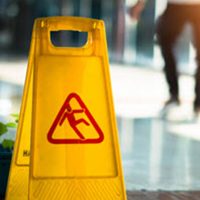Florida’s Slip & Fall Statute Places High Burden On Plaintiffs

One of the most common types of accidents seen in Florida personal injury cases is the slip-and-fall. While Florida businesses are no more or less reckless than those anywhere else, Florida has a higher percentage of residents over the age of 65 than any other U.S. state, and falls are a common cause of injury and hospitalization for those in that age group. If you slip and fall while on another person’s premises, you may have a civil case against the landowner – but if your accident occurs in a place of business, the law is stricter, and requires more of the injured plaintiff.
A “Transitory Foreign Substance”
Florida is a very commerce-friendly state, with low taxes and many laws favoring employers and businesses. One of them is the law passed to differentiate slip-and-fall accidents occurring in different places. It states that if a person slips on a “transitory foreign substance” in a “business establishment” (as opposed to in a private home or on public land), this is not sufficient grounds for the business to be liable for any injuries. Rather, the plaintiff must establish more evidence.
The law says that in order to hold a business liable for your slip-and-fall accident, you must establish that it had “actual or constructive knowledge” of the dangerous condition, and that they should have taken action to remedy it – in other words, that the danger had been there for enough time that the business should have been able to see it and correct it. The state legislature rationalized that if a danger was not foreseeable, it could not be corrected.
Actual Or Constructive Knowledge
The concept of “constructive knowledge” can be confusing for many plaintiffs; having ‘actual knowledge’ of something is easy enough to grasp, but ‘constructive’ knowledge requires clarification. In Florida, having ‘constructive’ knowledge means one of two things – either that a condition happens so often that it is foreseeable that it would happen again; or that the condition was there for long enough that a reasonable manager or employee would have discovered it. A plaintiff must prove one of these two concepts in order to have a chance at establishing liability.
In addition to this, keep in mind that Florida law does allow for what is known as contributory fault. If you are found to have been partially at fault for your own injuries, you may still recover damages minus your fault percentage – for example, if you are 20 percent liable for your injuries, you still might recover up to 80 percent of your damages. However, if you are found to be more than 50 percent at fault for your injuries, you may not recover any monetary damages at all.
Call A Slip-and-Fall Accident Attorney
If you have been injured after slipping in a business establishment, you need the right legal help on your side to increase your chances of recovering compensation. An Orlando slip-and-fall accident attorney from the Hornsby Law Group can help protect your rights. Contact our office at (407) 871-6375 to schedule a free consultation.
Source:
census.gov/quickfacts/fact/table/FL/PST045223